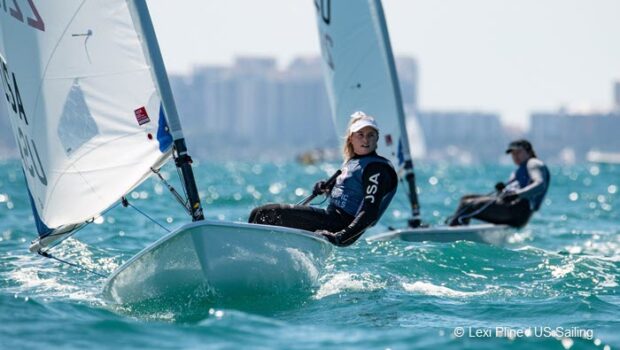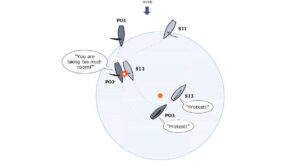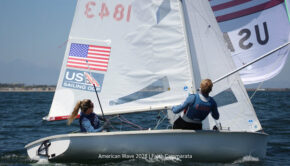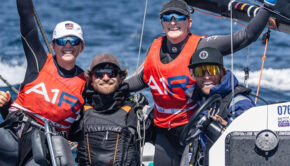Your Move, US Sailing
Published on February 22nd, 2024
Dean Brenner’s involvement with the US Olympic Sailing Program began as a competitor before transitioning to a member of the program’s oversight committee and then Chairman and Team Leader for the 2008 and 2012 Games. Amid the program’s recent struggles, Brenner provides a path forward in this report:
Nearly one year ago, Scuttlebutt published my essay on the “Root Cause Problem for US Olympic Sailing” in which I laid out the foundational, structural issues that have been plaguing our national program for decades. Yet today, we still have the same self-imposed structural roadblocks in place.
But worse, we now also have a leadership team at US Sailing that has lost the main plot line (cynics might add the word “again” to that phrase) and decided it was a good idea to launch a federal lawsuit against its largest donor organization.
Instead of pouring all focus, energy and resources into preparations for the Olympic Games later this year, the powers-that-be instead decided it was better to drain from their focus, energy, and limited resources to attack a former partner organization.
What a sad state of affairs!
But perhaps there is a silver lining. Perhaps this public relations train wreck provides an opportunity to bring the conversation back to the most fundamental issues. That’s my hope, at least.
A quick summary of what I wrote a year ago: the root cause problem for US Olympic Sailing is not about the talent of our sailors, the quality of our coaches, or the people involved. The most foundational problem holding back the performance of our US Olympic Sailing Program is structural, and this has been the case for a long time.
US Sailing, our National Governing Body, is responsible for an impossibly long list of programs and initiatives. One quick look at the main menus on the US Sailing website tells the tale quite simply, with no need to repeat it all here.
At its core, US Sailing is trying to be too many things to too many people, and it simply does not have the reach or the funds to do all of it well. We all know the cliché about “a jack of all trades.” US Sailing is trying to be all things to all people, which is an impossible task under any circumstances, but especially in our highly fragmented sport.
The vast majority of National Governing Bodies (NGBs) try to do one of two things well: Either they are primarily focused on the grass roots elements of their sport, OR they are primarily focused on their national team program. Very few, if any, try to be both at the same time in any serious way.
The critical success factors required to run a member-based, grass roots organization are completely different from what is required to run a high-performing professional sports team. The mission and mandates are different, the requirements are different, the energy and urgency are different… the DNA is entirely different.
I served on the Board of Directors at US Sailing from 2000-2012, and served as Chairman of US Olympic Sailing from 2004-2012. Prior to and during my tenure, there were serious attempts made to partition off the Olympic Program from the rest of US Sailing.
The best of US Sailing’s past Presidents (Bill Martin, who served from 1989-91, is a great example) and Executive Directors (the late Charlie Leighton set the gold standard) went to great lengths to leave the Olympic Program alone to run the team, delegating day-to-day management to the Olympic staff and the now-defunct Olympic Sailing Committee (OSC).
The OSC acted as a mini-Board, and provided the Olympic program with advice and counsel, relationships and introductions, stability, credibility, and most importantly, institutional knowledge… something which seems to be in short supply in US Sailing’s hallways these days. While it was not a fully autonomous Olympic Program structure, a nearly autonomous OSC was a reasonable and responsible solution that worked well for decades.
Since 2012, that has all changed. Multiple US Sailing Presidents and Executive Directors have undone any remaining autonomy, disbanded the OSC, and put the management of the Olympic Program under the firm control of the US Sailing Board, who are elected for a variety of reasons, interests and skill sets.
Not only has this led to continued poor performance on the water, but over the last three Olympic cycles, the program has been plagued by three separate staff implosions, constantly shifting plans and strategy, a collapse in funding and sponsorship, and most recently, this embarrassing federal lawsuit against a former partner organization.
In order to succeed, our Olympic Sailing Program needs a thorough and intelligent strategic plan, its own dedicated resources, and consistent leadership. None of these will be ever possible when the immediate authority for our National Team is led by a rotating Board of volunteer directors who are led by a rotating President, all of whom are also distracted by their responsibility to manage the dizzying number of programs and initiatives that US Sailing also has responsibility for.
I have written about this absolute need for Olympic autonomy and submitted it to US Sailing leadership many times in the last decade: in my exit memo to the US Sailing Board in November of 2012; in multiple memos for multiple US Sailing Presidents; and in the essay Scuttlebutt published one year ago.
And I am writing here again now.
It is time to find a way to once again give our US Olympic Sailing Program some distance from all the other stuff going on at US Sailing. Our program, and its staff, need to be led by a small group of people who wake up every morning with a single-minded focus, and the necessary business skills, to put a world-class professional sports team on the water, with the resources it needs to compete.
And so, it is time to get open-minded leaders from across our sport in a room, to have a serious conversation about how to fix the root cause structural problem of our US Olympic Sailing Program. We need to bring serious, experienced people together who know how to build, finance, and manage a professional sailing program. There is a lot of institutional knowledge out there, and more than enough well-intentioned, well-informed people who would come to the table to discuss possible solutions.
But first, US Sailing needs to stand down on this ridiculous lawsuit, which has, at a minimum, set their credibility back years in the court of public opinion.
Your move, US Sailing.
Respectfully,
Dean M. Brenner
Wallingford, CT
Background: Dean has been directly involved with the US Olympic Sailing Program, in many capacities, since 1995. He finished 2nd at the 2000 Trials with Ed Baird and Tom Burnham in the Soling Class; was a member of the Olympic Sailing Committee for the 2004 games; was Chairman and Team Leader for the 2008 and 2012 Games; and was an occasional, behind-the-scenes advisor for the 2016 Games. He sat on the Board of Directors for US Sailing from 2000-2012, and helped run the Sailing Foundation of New York, a major donor to Olympic Sailing, for nearly a decade.
Paris 2024 Olympic Sailing Program*:
Men’s One Person Dinghy – ILCA 7 (41)
Women’s One Person Dinghy – ILCA 6 (41)
Mixed Two Person Dinghy – 470 (19)
Men’s Skiff – 49er (20)
Women’s Skiff – 49erFX (20)
Men’s Kiteboard – Formula Kite Class (20)
Women’s Kiteboard – Formula Kite Class (20)
Men’s Windsurfing – iQFOiL (24)
Women’s Windsurfing – iQFOiL (24)
Mixed Multihull – Nacra 17 (19)
* Quota per event in parenthesis but does not include Universality Places (2 men, 2 women)
Venue: Marseille, France
Dates: July 28-August 9
Details:
• Paris website: https://www.paris2024.org/en/the-olympic-games-paris-2024/
• World Sailing microsite: https://paris2024.sailing.org/









 We’ll keep your information safe.
We’ll keep your information safe.